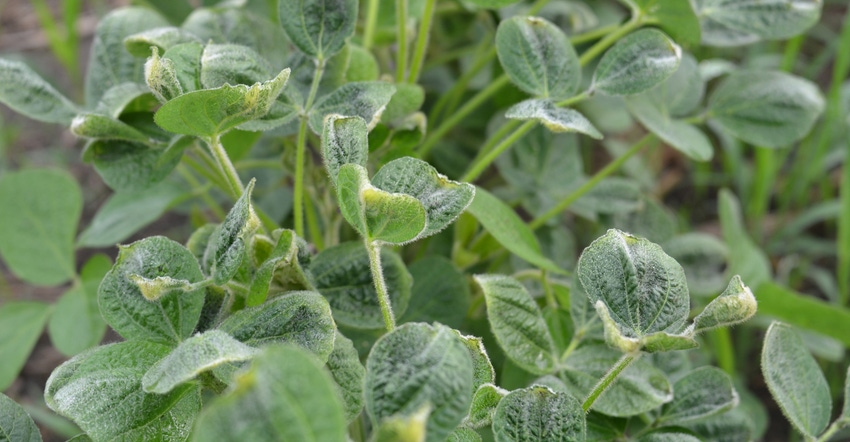
Following discussions with soybean farmers and Extension specialists, the Minnesota Department of Agriculture Dec. 9 announced it will work with four dicamba herbicide product manufacturers and the EPA to implement state-specific use restrictions for Minnesota during the 2022 growing season.
The restrictions are aimed at curbing off-site movement of dicamba herbicides applied to dicamba-tolerant soybeans. In 2021, MDA received the highest number of dicamba damage complaints since the product’s release in 2017.
MDA plans to register four products in 2022 with the following additional restrictions:
Date cutoff. No application shall be made south of Interstate 94 after June 12. North of Interstate 94, use is prohibited after June 30.
Temperature cutoff. No application shall be made if the air temperature of the field at the time of application is over 85 degrees F, or if the National Weather Service’s forecasted high temperature for the nearest available location for the day exceeds 85 degrees.
The state-specific restrictions require EPA approval and would appear on the federal label for each product. The MDA will also require that product makers provide approved education and training of applicators.
“We understand that dicamba is an important tool in combating herbicide-resistant weeds in dicamba-tolerant soybeans,” says Thom Petersen, agriculture commissioner. “However, these products must be used without impacts on neighboring homes, farms and gardens.”
The additional restrictions were based on scientific evidence gathered during MDA’s drift investigations, and discussions with the University of Minnesota Extension and Minnesota Soybean Growers Drift Task Force.
Bob Worth, a Lake Benton soybean grower and drift task force chair, said the date and temperature cutoff dates were task force recommendations. The nine-member committee, with statewide representation, provided input on their respective regions and reviewed MDA data to help form their recommendations.
“We need this product. It works well,” Worth says. “We don’t want it to affect our neighbors’ fields.”
When and if EPA will agree to the state-specific recommendations is uncertain. In 2021, EPA did not allow states to impose additional restrictions through a Special Local Need label, said Allen Sommerfeld, MDA senior communications officer.
“However, EPA has indicted to us that if states work with registrants, they would review additional restrictions that could be included on the federal label,” Sommerfeld says. “We are hopeful these additional restrictions can happen.”
Volatile history
Since dicamba was first registered for use on dicamba-tolerant soybeans in the 2017 growing season, MDA has fielded complaints each year of alleged off-site movement onto neighboring property. The chemical is highly volatile and can damage nontarget plant species through spray drift and volatilization. Volatility is influenced by several factors including temperature, relative humidity, rate of application, and crop stage.
In 2021, MDA received 304 complaints; in 2020, 128 complaints; in 2019, 20 complaints; in 2018, 51 complaints; and in 2017, 249 complaints.
The four affected dicamba formulations are Engenia by BASF, Fexapan by Corteva, Tavium by Syngenta, and XtendiMax by Bayer.
From 2018 to 2020, the MDA had placed an annual June 20 cutoff date on registered dicamba products, based on research and pesticide misuse complaints. The EPA enacted a federal cutoff date of June 30 in 2021.
The state also implemented a temperature cutoff for the 2018 growing season.
Other federal requirements for the products that will appear on the 2022 labels include:
• requiring an approved pH-buffering agent, also known as a volatility-reducing agent, be tankmixed with dicamba products prior to all applications
• requiring a downwind buffer of 240 feet, and 310 feet in areas where listed endangered species are located
• additional recordkeeping items
In addition to the cutoff date, Xtendimax and Tavium have crop growth stage cutoffs.
In Minnesota, Engenia, Fexapan, Tavium and XtendiMax formulations of dicamba are approved for use on dicamba-tolerant soybeans only, and are “restricted use pesticides.” The dicamba products are only for retail sale to, and use by, certified applicators. Pesticide product registrations are renewed on an annual basis in Minnesota.
About the Author(s)
You May Also Like






